After a first field mission to gather sectoral economic and trade data and information on oceans economy sectors and the ocean governance framework of the country, the second phase of the Oceans Economy and Trade Strategy (OETS) project consists of convening a national stakeholder workshop to discuss, identify and select promising ocean-based sectors for further analysis.
In the case of Barbados, four sectors have been preselected during the first phase of the project:
- Sustainable marine fisheries
- Sustainable marine aquaculture
- Seafood processing
- Coastal and Marine Environmental Services
During this first workshop, draft data factsheets for each of the four preselected sectors will be provided to the stakeholders for their feedback. They will also be provided with a legal and institutional overview of the ocean governance framework of the State, including information on the implementation of relevant provisions of the 1982 United Nations Convention on the Law of the Sea (UNCLOS) in Barbados.
The factsheets will present detailed information on economic, trade and social trends and data so the stakeholders can evaluate and take an informed decision on which two sectors they would like to bring to the next stage of the project in order to develop a national strategy. The legal and institutional overview will offer information on the framework for ocean governance and the implementation of relevant UNCLOS provisions with specific regard to the four preselected sectors, to provide participants with an overview of the governance context within which the oceans economy sectors operates. The presentation of this information and the subsequent discussions throughout the workshop will also provide the participants with an opportunity to acquire knowledge conducive to reinforcing an enabling trade sectoral trends and the ocean governance environment to foster cross-sectoral policy coherence. Such coherence is crucial for the sustainable development of the Oceans Economy.
After the selection of two ocean-based sectors, stakeholders will be consulted on how the value chains are built and function, as well as the main strengths, weaknesses, opportunities for, and challenges to, promoting sustainable economic growth and trade in those sectors in internal and external markets.
The workshop will seek to involve various stakeholders such as governmental institutions, the private sector, the civil society, financial entities and relevant international organizations.
This workshop is co-organized by United Nations Conference on Trade and Development, the United Nations Division of Oceans Affairs and the Law of the Sea, in cooperation with the UN Programme for the Green Economy and the Commonwealth Secretariat. National partners include the Ministry of Maritime Affairs and the Blue Economy and the Ministry of Environment and Drainage.




 4 March, 2020.
4 March, 2020.